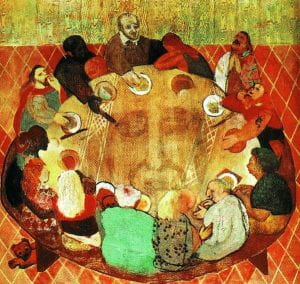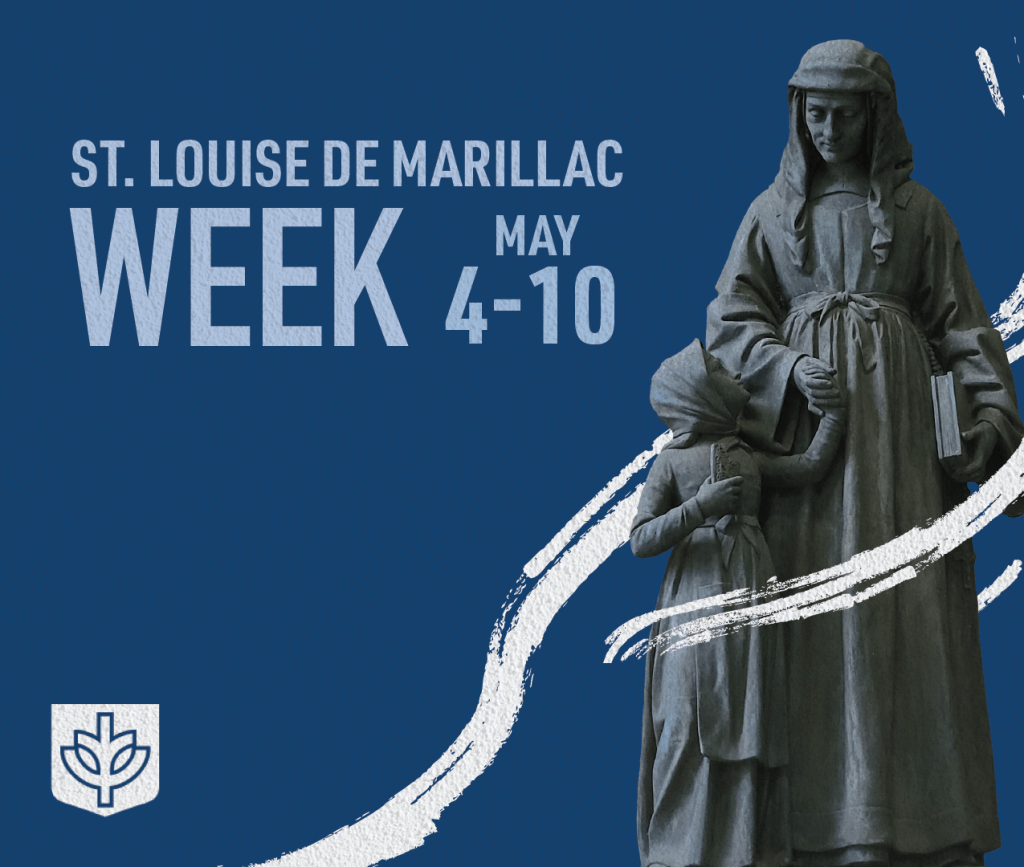
In honor of Saint Louise de Marillac’s Feast Day on May 9th, the Division of Mission and Ministry invites the DePaul community to celebrate Louise Week from May 4-10.
As a DePaul community, our strategic planning context is inviting us to dream, design, and innovate – and Saint Louise provides us a unique example of Vincentian leadership. Her life was a demonstration of love in action through her innovation and entrepreneurial spirit. She along with her female contemporaries provided the shoulders that bore the weight of crisis that they experienced in a country racked by war, entrenched in political upheaval, overwhelmed by the plague, and struck by hunger. In community, these women collaborated across difference, uplifted the gifts in those they served and created new pathways forward to respond to those on the margins. Her story reminds us of the possibility of transforming systems and lives.
We kick off Louise Week 2024 with Vincentian Service Day on May 4th followed by a week of celebration. Just as Saint Louise was sustained by the generosity and goodness of those around her, may we too take the time to pause, uplift, and celebrate with gratitude those who sustain our journey and inspire us.
Finally, this year there is a distinctive way for all to honor Saint Louise’s life and legacy: give a Shared Coin to a student, faculty, or staff you have witnessed living DePaul’s mission. In honor of the 400th anniversary of St. Louise de Marillac’s Lumiere moment, this year’s Shared Coin quote is:
“Encourage one another and may your mutual good example speak louder than any words can.”
– St. Louise de Marillac
For more information about the Shared Coin Tradition, including how to pick up a coin, check out the website at: go.depaul.edu/sharedcoin.
Join us!
Vincentian Service Day
Date: Saturday, May 4 | Location: LPC – Cacciatore Stadium | Time: 8:30 am
Started in 1998, Vincentian Service Day is a DePaul tradition where students, staff, faculty, and alumni come together to participate in a day of service with community partners in Chicago.
DAB Tie Dye Tuesday: Celebrating Louise & Friends
Date: Tuesday, May 7 | Location: Cortelyou Commons Patio | Time: 1:00 pm – 5:00 pm
Join DAB for a fun afternoon making special Louise & Friends Tie Dye T-shirts! Don’t miss this chance to learn about the legacy of St. Louise de Marillac and other powerful women in DePaul’s history!
Catholic Charities Tuesday Night Supper
Date: Tuesday, May 7 | Location: 721 N. LaSalle St. | Time: 3:30 pm – 6:00 pm
Join the Meet Me at the Mission and DCSA in serving the Catholic Charities Tuesday Night Supper at 721 N. LaSalle St. Participants will help to prep and serve a hot meal to guests who may be experiencing homelessness or are recently arrived migrant families. Come ready for a meaningful Vincentian service experience to learn about the legacy of the Daughters of Charity in Chicago.
Meet in the Interfaith Sacred Space, 1st Floor of the Student Center across from Suite 104, between 3:30-3:45 to take the train together to the location downtown. RSVP required due to limited space.
DeHub Link: https://cglink.me/2cC/r384449
Lunch with Louise (Faculty & Staff)
Date: Wednesday, May 8 | Location: Loop – 11th Floor DePaul Center, The DePaul Club | Time: 11:30 am – 1:00 pm
DePaul faculty and staff, please join us for our annual Lunch with Louise honoring the life and legacy of St. Vincent de Paul’s great friend and collaborator, St. Louise de Marillac. This year, we are delighted to have as our featured guests Deans Lucia Dettori, Lexa Murphy and Tatum Thomas from the Colleges of Computing and Digital Media, Communications and the School of Continuing and Professional Studies. We look forward to these university leaders gathering for a spirited dialogue about the challenges and rewards of their jobs as well as sharing how DePaul’s Vincentian mission has helped inform and guide their work at DePaul (and beyond) and their visions for the future. Please join us!
Now in its 16th year, Lunch with Vincent is a casual, hybrid (you may participate either in person or over Zoom) program for faculty and staff designed to nurture relationships among community members and deepen our understanding of our Vincentian mission. At each gathering, we present meaningful topics that are inspired by our mission as well as the interesting events of our times. We seek to highlight people and programs at DePaul that energize and challenge us as well as illuminate how our mission may be lived out more fully in today’s world. Hope to see you!
DeHub Link: https://cglink.me/2cC/r387164
Catholic Community Night
Date: Wednesday, May 8 | Location: LPC – Student Center Suite 104 | Time: 5:00 pm – 6:00 pm
Join CCM’s Catholic Community Night!
Louise Feast Day Mass & Lunch
Date: Thursday, May 9 | Location: LPC – St. Louise de Marillac Chapel & LPC Student Center 104, Loop – Chapel on 1st floor of Lewis Center & The DePaul Club 11018 | Time: Mass – 12:00 pm, Lunch – 12:45 pm
Celebrate the Feast Day with a celebratory lunch at 12:45pm. Everyone is welcome! For the Lincoln Park Campus, come to Catholic Campus Ministry (Student Center 104). In the Loop, join us in the DePaul Club on the 11th floor of the DePaul Center.
Loop Louise & Friends Celebration
Date: Thursday, May 9 | Location: DePaul Center 11th Floor Gallery & Terrace | Time: 1:00 pm – 4:00 pm
Join the Office of Student Involvement and Mission and Ministry to celebrate the feast of St. Louise de Marillac. Stop by for a snack, learn about the legacy of Louise and other powerful women in DePaul’s history and get your free Louise & Friends t-shirt.
DeHub Link: https://cglink.me/2cC/r386614
Cafecito con Tepeyac
Date: Thursday, May 9 | Location: LPC – Student Center Suite 380 | Time: 3:00 pm – 4:00 pm
Join us for a conversation about women’s leadership, the legacy of St. Louise de Marillac and community with Latinx students. Cafecito and a snack will be provided!
DeHub Link: https://cglink.me/2cC/r386859
Dinner with Daughters
Date: Thursday, May 9 | Location: Sanctuary Hall, 2347 N. Kenmore Ave | Time: 5:30 pm – 6:30 pm
Have you ever met a Daughter of Charity? Join Meet Me at the Mission and Residence Education & Housing for dinner and conversation to celebrate the Feast of St. Lousie de Marillac. Don’t miss this opportunity to hear these amazing women share their story of how they continue to live the legacy of St. Louise de Marillac today.
DeHub Link: https://cglink.me/2cC/r386738



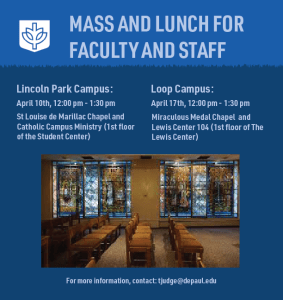 Mass and Lunch for Faculty and Staff
Mass and Lunch for Faculty and Staff Lunch with Vincent: A Conversation with Maureen McGonagle
Lunch with Vincent: A Conversation with Maureen McGonagle
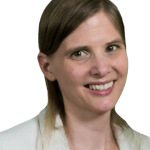

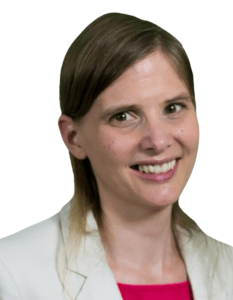 Jen Sweet, a former employee of DePaul, passed away on April 6 after fighting cancer for 16 years. Before leaving DePaul for her medical treatment, Jen had served as the director of assessment at the Center for Teaching and Learning. While helping schools and colleges with accreditation related assessment reports, she inspired many faculty and staff with her unbeatable spirit and commitment to work and life.
Jen Sweet, a former employee of DePaul, passed away on April 6 after fighting cancer for 16 years. Before leaving DePaul for her medical treatment, Jen had served as the director of assessment at the Center for Teaching and Learning. While helping schools and colleges with accreditation related assessment reports, she inspired many faculty and staff with her unbeatable spirit and commitment to work and life.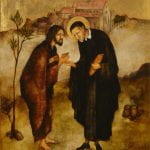
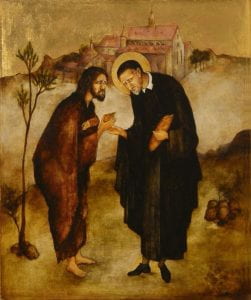
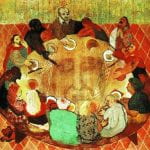
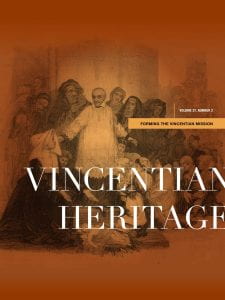 Vincentian Heritage Journal
Vincentian Heritage Journal